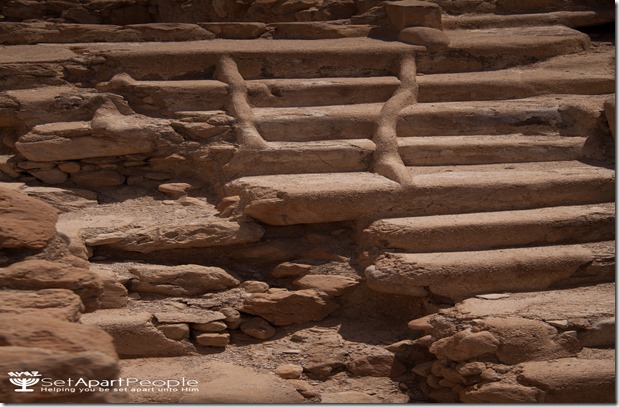 You probably have heard someone say they have gone into a mikvah, or that they have immersed themselves in water for some spiritual purpose. We have done it a couple of times ourselves, without really knowing the significance of it.
You probably have heard someone say they have gone into a mikvah, or that they have immersed themselves in water for some spiritual purpose. We have done it a couple of times ourselves, without really knowing the significance of it.
We immersed ourselves when we became believers, then again, when we became Torah observant and again three years ago when we went to Israel. We felt a need to be immersed in the Jordan river, not knowing that it would be quite significant for us. We shall share more about this later.
So what is the significance of going into a mikvah, if anything? What does Scripture teach us? There are many references in Scripture to washing for personal hygiene as well as for ritual purification purposes. We also see people being immersed in water when they come to faith. Y’shua was immersed in water before He started His ministry. How are we to understand this and how do we apply it in our lives? Are we to immerse ourselves in water as part of our religious observance and if so, how are we to do this?
In this article, we shall focus on the Scriptural foundation and significance of immersion. In a follow-up article we shall look at immersion in a more practical way. We would first like to find out where the idea of “going into a mikvah” comes from when speaking of immersion in water.
What is a mikvah?
A mikvah, in Judaism, is a pool of water, used for attaining ritual purity. The word “mikvah” or “mikveh” is used when referring to this body of water. What is the origin of this? Is this scriptural or traditional?
What does the word “mikvah” mean?
The Hebrew word “miqweh” is a derivative of the root “qavah” and is used for the first time in the book of Genesis. It was translated as a “gathering of waters.”
Genesis 1:10
10 Elohim called the dry land earth, and the gathering of the waters He called seas; and Elohim saw that it was good.
The Dictionary of Biblical Languages explains the meaning as follows:
“Mikvah” is used three more times, in Scripture, in the context of “gathered” water, translated as a reservoir twice and once as collecting.(Ex 7:19; Lev 11:36; Isa 11:36). But what about this hope?
Hope?
The word “mikvah” also means hope. This hope, to me, means the hope that goes with this act of immersion, the hope or expectation of being cleansed and being able to start fresh. You will understand the significance as we proceed. The word “mikvah” is, in Scripture, not used in the direct context of washing for purification. It is only the collection of water and the expectation that connect this word with ritual immersion. Now that we have established the meaning of the word “mikvah,” let us dig deaper and see what else we can learn about washing.
Washing in the Tanakh
The Hebrew word “rahas” is normally translated as “wash” in the Tanakh. This word in its various forms is used 72 times in the Tanakh when referring to cleansing, whether for personal hygiene or for ritual purification purposes.
Here is an example of the word “rahas” used in the context of ritual purification.
Leviticus 15:16
16 ‘Now if a man has a seminal emission, he shall bathe all his body in water and be unclean until evening.
Take note here the bathing alone does not render him clean, the bathing and the passing of time together renders him clean. When we did the study on clean and unclean, we learned that there are different ways of becoming ritually clean after having been defiled, depending on the source of the uncleanness. Water is almost always involved.
Washing in the Apostolic writings
Many different Greek words are used to describe washing in the Apostolic writings. We will not be going into detail of each one. Two of these words are relevant to our study:
In general, taking all Scripture into consideration, we can identify three main categories of washing, pertaining specifically to people.
- foot washing
- bathing
- washing from sin
We will briefly look at each of these for better understanding.
Foot washing
There are two facets to foot washing, physical and spiritual. As we have seen from the above quote, washing of feet was mostly done as an act of hospitality for the physical purpose of cleaning dusty feet. There are, however, two examples where the washing of feet had a spiritual significance. The feet of the priests were washed prior to entering the sanctuary, and before they approached the altar (Ex 30:19–21; Ex 40:31). This was done in order to ensure ritual purity. The other example is where Y’shua washed the feet of His disciples to demonstrate how they (we) are to serve one another (John 13:1-20).
We have experienced the act of reciprocal foot washing. It is something we have done a few times when we got together with believers and once as part of a Pesach Seder. It is an experience, both humbling and edifying, a loving act of service to brothers or sisters in Y’shua. Is it something we should be doing? We believe we are to wash each other’s feet regularly, to remind us that we are to serve one another, just like Y’shua demonstrated to His disciples.
Bathing
- Pharaoh’s daughter was bathing in the Nile when she found Moses (Ex 2:5)
- Aaron and his sons were washed as part of the process of inducting them into the priesthood (Lev 8:6)
- Newborn infants were bathed before they were swaddled in cloths (Eze 16:4)
- A cleansed leper has to bathe as part of the extensive rites for removing the impurity associated with leprosy (Lev 14:8)
- Naaman was prescribed bathing in the Jordan seven times as a cure for leprosy (2 Kin 5:10)
- John 5:2–8 contrasts the healing power of the pool of Bethesda with that of Y’shua, who heals without water.
- Mourners, did not bathe while mourning, however, at the end of mourning they would bathe, anoint themselves and put on fresh clothing (2 Sam 12:20)
- Women would bathe as part of normal hygiene (Eze 23:40; Rut 3:3 and 2 Sam 11:2-4)
Archaeological testimony to bathing in Iron Age Israel includes a 9th-century bathtub found at Tel Dan, 6th-century wash basins found in the guestrooms at Tell Beit Mirsim, cisterns lined with lime plaster found in typical Israelite private dwellings from the beginning of the Iron Age, and the 8th-century pottery figure of a woman bathing in a shallow bowl (perhaps a bidet?) from er-Ras cemetery at ez-Zib.4
Once again, we see washing for both physical and spiritual reasons here. We all know that the body needs regular cleaning. However, spiritual cleaning is of interest to us. Aaron and His sons were bathed with water when they were consecrated. We also see the leper being cleansed from his uncleanness of leprosy after he has been healed. Then we have all the other examples of washing for ritual cleanness. These washings were symbolic of the removal of uncleanness that cannot be seen, spiritual uncleanness. This is along the same lines as washing away sin.
Spiritual washing
We have learned before, when we studied about uncleanness, that sin causes spiritual uncleanness. You can read more about it in “Spiritual uncleanness and shadows.” This is what King David was referring to in Ps 51 when He asked YHVH to wash him from his iniquity and to cleanse him from his sin.
Psalm 51:2
2 Wash me thoroughly from my iniquity And cleanse me from my sin.
There are other references where water is mentioned in the context of sin and impurity. In Zechariah, the following is prophesied:
Zechariah 13:1
1 “In that day a fountain will be opened for the house of David and for the inhabitants of Jerusalem, for sin and for impurity.
This imply that this fountain will be used for the purification of sin and impurity. The Hebrew word “maqor” is used here, meaning a source:
Wait a minute, we see here that this fountain is the source, and this source of living water is for taking away impurity AND sin. This is more profound than you probably realize… is this really a physical fountain?
YHVH, our hope, the source of living water
Let us just go a few steps back. Where in Scripture do we get other references about a fountain? YHVH calls Himself the fountain of living waters. 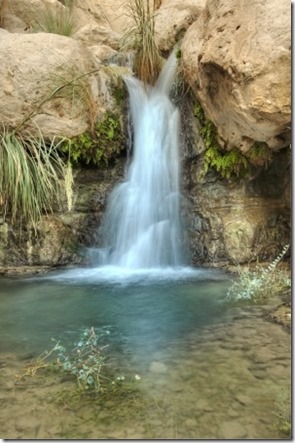
Jeremiah 2:13
13 “For My people have committed two evils: They have forsaken Me, The fountain of living waters, To hew for themselves cisterns, Broken cisterns That can hold no water.
YHVH is the fountain, the source of living water. He cleanses us from our sin; we are not cleansed by our works. Wait, there is even more…
Jeremiah 17:13
13 O YHVH, the hope of Israel, All who forsake You will be put to shame. Those who turn away on earth will be written down, Because they have forsaken the fountain of living water, even YHVH.
Do you see this? Do you know which Hebrew word was translated as “hope?” It is “miqwah!” YHVH is the hope (miqwah in Hebrew); He is also the fountain (source) of living water. So every time we immerse ourselves in water, it is symbolic of how YHVH purifies us. This is indeed very profound! YHVH is our mikvah! He cleanses and purifies us! It is not our act of immersing ourselves that cleanses us, this act is only symbolic of YHVH cleansing us!
How does He do this?
Y’shua, our hope, the source of living water
It is written in the Apostolic writings that Y’shua is our hope and source of living water.
1 Timothy 1:1
1 Paul, an apostle of Messiah Y’shua according to the commandment of Elohim our Savior, and of Messiah Y’shua, who is our hope,
John 4:10
10Y’shua answered and said to her, “If you knew the gift of Elohim, and who it is who says to you, ‘Give Me a drink,’ you would have asked Him, and He would have given you living water.â€
Revelation 21:6
6 Then He said to me, “It is done. I am the Alpha and the Omega, the beginning and the end. I will give to the one who thirsts from the spring of the water of life without cost.
How can this be? Is our hope and source of purification YHVH or Y’shua? We have previously written an article “Who is Y’shua?” You will be able to find the answer there…Here is a hint:
John 10:30
30 “I and the Father are one.â€
John 17:21
21 that they may all be one; even as You, Father, are in Me and I in You, that they also may be in Us, so that the world may believe that You sent Me.
Do you understand this? When we immerse ourselves in water in the physical, we are washed clean spiritually through our faith in Y’shua.
Titus 3:5
5 He saved us, not on the basis of deeds which we have done in righteousness, but according to His mercy, by the washing of regeneration and renewing by the Holy Spirit,
The word regeneration means rebirth:
Y’shua’s name means salvation of YHVH, and that is what He brought us through His sacrificial death. So when we immerse ourselves, it could be likened to returning to the womb, and coming out of the water to be born again.
Being born again
Y’shua also used this allegory.
John 3:3–5
3 Y’shua answered and said to him, “Truly, truly, I say to you, unless one is born again he cannot see the kingdom of Elohim.†4 Nicodemus said to Him, “How can a man be born when he is old? He cannot enter a second time into his mother’s womb and be born, can he?†5 Y’shua answered, “Truly, truly, I say to you, unless one is born of water and the Spirit he cannot enter into the kingdom of Elohim.
This is also the reason John the Baptist was immersing people in water, baptising them with a baptism of repentance.
Mark 1:4
4 John the Baptist appeared in the wilderness preaching a baptism of repentance for the forgiveness of sins.
This immersion John did, was symbolic of a spiritual washing that took place; those baptised were being born again in the spirit. This concept of being born again, being a new creature, is often used in the Apostolic writings. Where does this originate from? Did you know that the concept of being born again is not a New Testament-only concept? It is customary for new converts to Judaism to immerse themselves. It is symbolic of washing away your past life and re-emerging into the new life as a new creature, being born again. This procedure is called “tevillah.†This was practiced already in the time of Y’shua and is probably the origin of what we know as baptism.
Why go into a mikvah?
We have learned that immersion or baptism is a physical act with a spiritual significance. When we go into the water, we symbolically enter the womb again and are born a new creature. From what we have studied this far, we have learned that there are mainly two reasons for going into a mikvah.
Immersion of purification
The first reason is for the removal of ritual impurity. This immersion, symbolic of the removal of ritual impurity, was practiced by all believers in YHVH. It was commanded to be ritually pure, before entering the Tabernacle or Temple. (We shall not go into much more detail here, as we have studied this already in some detail in the articles “Uncleanness and separation…are these commandments still for us?“,“Family purity and the law of Niddah“ as well as “Spiritual uncleanness and shadows…” You will learn that ritual cleanness is in most cases connected to purification with water. This was very important at the time when the Tabernacle and Temple were in use. However, this was not the only reason for immersing in water.
Immersion of repentance
The Jews in the time of Y’shua were familiar with the concept of the washing away of sin (Ps 51:2; Ps 51:7; Is 1:16; Is 4:14,) they, therefor, did not find it strange when John the Baptist preached water baptism as an outward demonstration of repentance from sin. Scripture teaches that sin causes spiritual uncleanness. This spiritual uncleanness is removed, through repentance and faith in Y’shua, when a person becomes a believer. Baptism is an outward demonstration of this cleansing. When we became believers, we left behind our sinful ways, our old life. To go into the mikvah is symbolic of leaving behind this old life and becoming a new creature, being born again.
2 Corinthians 5:17
17 Therefore if anyone is in Messiah, he is a new creature; the old things passed away; behold, new things have come.
Colossians 2:12
12 having been buried with Him in baptism, in which you were also raised up with Him through faith in the working of Elohim, who raised Him from the dead.
Acts 2:38
38 Peter said to them, “Repent, and each of you be baptized in the name of Y’shua Messiah for the forgiveness of your sins; and you will receive the gift of the Holy Spirit.
This conversion is a spiritual transition that takes place. A transition is to change from one state or condition to another. There are many examples of people undergoing a spiritual transition and then going into a mikvah or being baptized. Let us search the Scripture.
Immersion of transition
Our best example is of when Y’shua went to John to be immersed. We have to ask the question: why was Y’shua immersed in the Jordan?
Matthew 3:13
13 Then Y’shua arrived from Galilee at the Jordan coming to John, to be baptized by him.
Was He ritually impure, or was He a sinner who converted? We know He was without sin, so the latter does not apply, and we know He was immersed in the Jordan, not at the Temple where you would expect Him to be immersed in case of ritual impurity. We can, therefor, conclude that there must have been another reason. This immersion of Y’shua was at the very beginning of His ministry.
Acts 1:21–22
21 “Therefore it is necessary that of the men who have accompanied us all the time that the Master Y’shua went in and out among us— 22 beginning with the baptism of John until the day that He was taken up from us—one of these must become a witness with us of His resurrection.â€
Y’shua’s immersion was symbolic of a transition in His life, the beginning of His ministry. Another three people come to mind: Cornelius, Lydia and the man from Ethiopia, that Phillip met. They were all believers in YHVH; they were not converting to a new religion. To them were revealed who their Messiah was; it was a spiritual transition to them. Let us look at each of these in more detail. You can read all that took place concerning Cornelius in Acts 10; we just want to point to two specific verses.
Acts 10:1–2
1 Now there was a man at Caesarea named Cornelius, a centurion of what was called the Italian cohort, 2 a devout man and one who feared Elohim with all his household, and gave many alms to the Jewish people and prayed to Elohim continually.
Cornelius was already a believer in YHVH, but through Peter and what took place here, Y’shua was revealed to Him as Messiah. He did not stop being a believer in YHVH so it was different from a “conversion” in the sense, we understand it. It was a spiritual transition that took place. After this, they were baptized…
Acts 10:48
48 And he ordered them to be baptized in the name of Y’shua Messiah. Then they asked him to stay on for a few days.
Let us now look at the story of Lydia..
Acts 16:14–15
14 A woman named Lydia, from the city of Thyatira, a seller of purple fabrics, a worshiper of Elohim, was listening; and YHVH opened her heart to respond to the things spoken by Paul. 15 And when she and her household had been baptized, she urged us, saying, “If you have judged me to be faithful to YHVH, come into my house and stay.†And she prevailed upon us.
Once again , she was already a believer in YHVH, just like Cornelius…Now what about the Ethiopian man?
Acts 8:27–28
27 So he got up and went; and there was an Ethiopian eunuch, a court official of Candace, queen of the Ethiopians, who was in charge of all her treasure; and he had come to Jerusalem to worship, 28 and he was returning and sitting in his chariot, and was reading the prophet Isaiah.
Acts 8:35–38
35 Then Philip opened his mouth, and beginning from this Scripture he preached Y’shua to him. 36 As they went along the road they came to some water; and the eunuch said, “Look! Water! What prevents me from being baptized?†37 [And Philip said, “If you believe with all your heart, you may.†And he answered and said, “I believe that Y’shua Messiah is the Son of Elohim.â€] 38 And he ordered the chariot to stop; and they both went down into the water, Philip as well as the eunuch, and he baptized him.
Once again, the Eunuch was a believer, but he was baptized after Y’shua was revealed to Him as Messiah. These people did not convert to Christianity as is taught. Christianity as a religion did not exist at this time. The believers in Y’shua were part of a sect of Judaism called “the Way” and they continued in obedience, doing the commandments of YHVH. This may still seem superficial to you, and it is, if you consider that immersion is a deep spiritual experience.
Immersion and faith
We have been saying all along that there is a spiritual significance to going into the mikvah, it is symbolic of YHVH’s cleansing of us from our impurity and sin. Immersing, for this reason, brings us closer to YHVH. Allow us to explain. Immersion strengthens our faith, because when we immerse ourselves under the water, we do it in the faith that YHVH will remove all uncleanness from us, and we come out as a new creature. We now have a clean slate and can start over. Being clean means that we are closer to our holy Heavenly Father. He tells us to be holy, because He is holy.
Leviticus 20:26
26 ‘Thus you are to be holy to Me, for I YHVH am holy; and I have set you apart from the peoples to be Mine.
When we immerse we become holy at least until we sin again, but for that moment, we are as close to our Father in faith as we will ever be. Standing in His presence, having been washed clean.
That is how we experienced it. We would like to share with you our special immersion experience. Knowing what we have learned through this study has shown us the significance of our immersion in the Jordan three years ago. Â 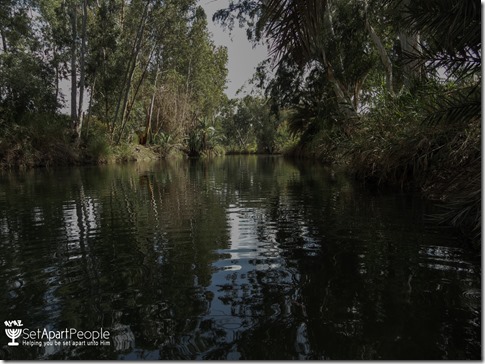
Immersing ourselves in the Jordan
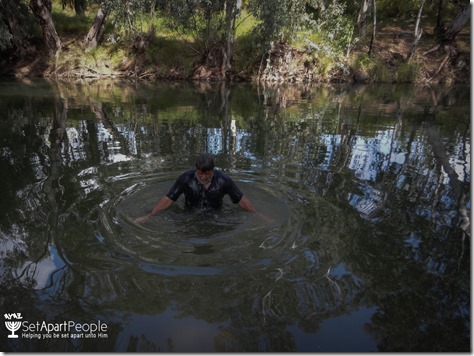 We went to Israel for the first time, three years ago. We have been putting it off for many years but decided to go to Israel for the feast of Pesach and Unleavened bread in 2011. We first went to Jerusalem for the feast, and departed to the Galilee after the seventh day of Unleavened bread, after having spent an unforgettable time in Jerusalem. We stayed in Tiberius and traveled around in the area for a few days. We went to see some of the places mentioned in the Bible. It was really great; we would first read the passages to the kids and then go there. The Bible makes a wonderful travel guide when in Israel. :)
We went to Israel for the first time, three years ago. We have been putting it off for many years but decided to go to Israel for the feast of Pesach and Unleavened bread in 2011. We first went to Jerusalem for the feast, and departed to the Galilee after the seventh day of Unleavened bread, after having spent an unforgettable time in Jerusalem. We stayed in Tiberius and traveled around in the area for a few days. We went to see some of the places mentioned in the Bible. It was really great; we would first read the passages to the kids and then go there. The Bible makes a wonderful travel guide when in Israel. :)
During our time in Jerusalem, we were already talking about the possibility of immersing ourselves in the Jordan. Not knowing quite how to go about it, we put it off until our last Sabbath in the Galilee. It was raining that morning, and we studied in the room until early afternoon. We decided to drive to the Jordan to do this immersion. We found a quiet spot a bit downstream from the official baptismal site, because we really didn’t want to go to this site, as it was so commercial and would have had to pay for it on the Sabbath. There was nobody but us at the river, and it was truly beautiful. After finding a spot we went down into the water, and after praying together, Schalk helped each of us to immerse ourselves before immersing himself. We basically supported each other as we went under the water. We really experienced YHVH’s presence and peace. We went back to our accommodation feeling such joy and peace.
We really wanted to do this immersion, but we did not really understand why we needed to do it. It has since became clear to us that it was in a way the start of our ministry. Doing this study about the significance of immersion, confirms this. It remains a highlight in our spiritual journey.
Conclusion
What have we learned from this study?
The purpose of this article was to provide a scriptural foundation for immersion. We have learned that a mikvah is a collection of water that can be used for the symbolic cleansing of both ritual and spiritual uncleanness. The Tanakh lays the foundation of what we know today as baptism or immersion. We have also learned that the act of immersing into water is symbolic of YHVH cleansing us from our impurity and sin through our faith in Y’shua. We have also learned of three different but similar immersions and when each one applies. We have also learned what the deep spiritual significance of immersion is.
We shall, in the follow-up article, go into more detail as to how and where this immersion could take place. We hope this study was as much a blessing to you as it was to us. May YHVH bless you as you ponder on this….
Please also share with us if you have had a profound mikvah experience, it will bless us greatly if you do!
Gallery
Here are some photo’s we took in Jerusalem of a mikvah from the second Temple period. Just click on the photo’s to enlarge and view or on view slideshow.
Take note of how the steps are divided to ensure those who are ritually clean do not come into contact with those who are still to immerse themselves. These cisterns were filled with rainwater which is considered living water, and were used by pilgrims (or anybody) who wanted to immerse themselves before going into the Temple. There are about twenty mikvah’s similar to this one in this one area. This shows us on what scale these immersions could be done.
References
- Swanson, J. (1997).Dictionary of Biblical Languages with Semantic Domains : Hebrew (Old Testament). Oak Harbor: Logos Research Systems, Inc.
- Vine, W. E., Unger, M. F., & White, W., Jr. (1996).Vine’s Complete Expository Dictionary of Old and New Testament Words. Nashville, TN: T. Nelson.
- Tucker, J. T. (2000). Footwashing. (D. N. Freedman, A. C. Myers, & A. B. Beck, Eds.)Eerdmans dictionary of the Bible. Grand Rapids, MI: W.B. Eerdmans.
- Gruber, M. I. (2000). Bathing. (D. N. Freedman, A. C. Myers, & A. B. Beck, Eds.)Eerdmans dictionary of the Bible. Grand Rapids, MI: W.B. Eerdmans.
- http://jesus-messiah.com/html/mikveh.html


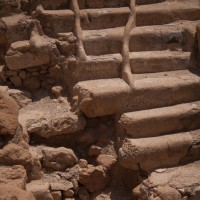
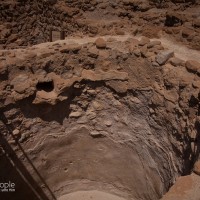









Leave a Reply